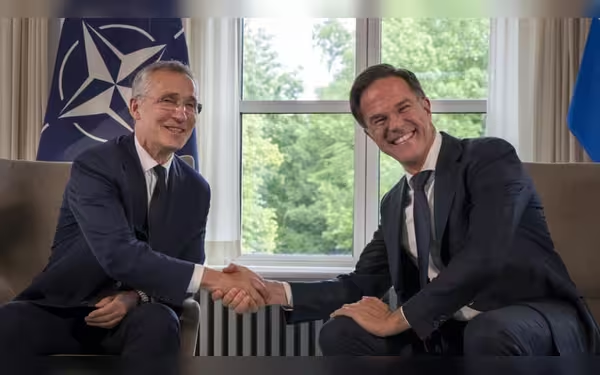Sunday, October 6, 2024 04:21 AM
NATO Leadership Transition: Stoltenberg to Rutte Amid Ukraine Conflict
- Stoltenberg steps down after a decade of leadership.
- Mark Rutte takes over as NATO Secretary General.
- NATO adapts to new security challenges post-Ukraine war.
 Image Credits: channelnewsasia
Image Credits: channelnewsasiaJens Stoltenberg passes NATO leadership to Mark Rutte as the alliance adapts to new security challenges amid the ongoing Ukraine conflict.
NATO, the North Atlantic Treaty Organization, has been a cornerstone of transatlantic security since its inception in 1949. Over the years, it has adapted to various global challenges, but the recent conflict in Ukraine has underscored the alliance's importance in maintaining peace and stability in Europe. As the world watches closely, a significant transition is underway within NATO's leadership.
After a decade of service, Jens Stoltenberg, the current Secretary General of NATO, is set to pass the torch to former Dutch Prime Minister Mark Rutte. Stoltenberg has led the alliance through tumultuous times, including the ongoing war in Ukraine, which has tested NATO's unity and resolve. His tenure has been marked by a commitment to collective defense and a focus on strengthening ties among member nations.
Mark Rutte, who will officially take over in October, brings a wealth of experience to the role. Having served as Prime Minister of the Netherlands for over a decade, Rutte is well-versed in international diplomacy and has been an advocate for a strong NATO. His leadership style is characterized by pragmatism and a collaborative approach, which will be crucial as NATO navigates the complexities of modern security threats.
The transition in leadership comes at a critical time. The war in Ukraine has not only reshaped the geopolitical landscape but has also highlighted the need for NATO to adapt its strategies to address emerging challenges. Rutte's appointment signals a commitment to continue the alliance's focus on deterrence and defense, while also fostering dialogue with non-member countries.
As Stoltenberg steps down, he leaves behind a legacy of resilience and adaptability. His efforts to enhance NATO's readiness and response capabilities have been pivotal in reassuring member states of their security commitments. The alliance has also expanded its partnerships globally, recognizing that security threats are not confined to Europe.
Looking ahead, Rutte's leadership will be instrumental in shaping NATO's future. He will need to address pressing issues such as cybersecurity, climate change, and the rise of authoritarian regimes. The challenge will be to maintain unity among member states while responding effectively to these evolving threats.
The transition from Jens Stoltenberg to Mark Rutte marks a new chapter for NATO. As the alliance faces unprecedented challenges, the leadership change offers an opportunity for renewed focus and strategic direction. The world will be watching closely to see how Rutte navigates these complexities and upholds NATO's commitment to collective security. The stakes are high, and the future of transatlantic relations hangs in the balance.













